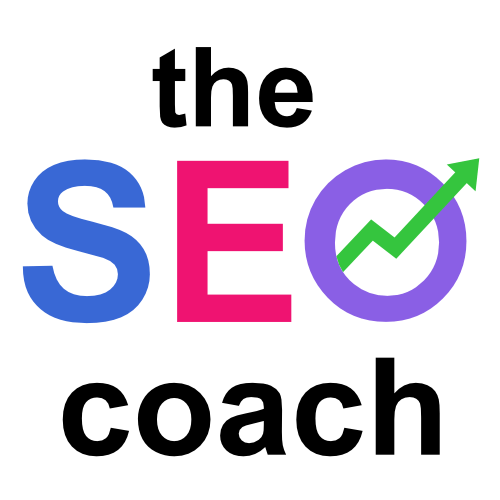Debunked by The SEO Coach!
SEO (Search Engine Optimization) advice is everywhere, but let me tell you something from someone who’s been in this business for too many years to count. Most of what passes for “expert guidance” is flat-out wrong. I’ve watched countless website owners waste thousands of dollars following outdated myths that hurt their rankings instead of improving them.
Let’s debunk the five most damaging SEO myths holding your website back:
Myth #1: More Content Equals Better Ranking
You’ve probably heard “content is king” and assumed that means producing as much as possible on any topic to attract website visitors. After all, more visits is good, right? Wrong. This leads to what I call “Death by a Thousand Blog Posts” – exhausting yourself creating endless content without strategic purpose and intent.
The Truth:
Quality trumps quantity, but strategic intent is paramount. One of my clients came to me frustrated after her previous SEO company had her ranking #1 for “best restaurants in New Haven, Connecticut.” The problem? Her company installed commercial lighting systems in Austin, Texas! Those website visitors had zero chance of becoming customers.
Search engines prioritize comprehensive, authoritative content that answers user questions. However, if those users aren’t your ideal customers, those rankings are worthless. One exceptional, in-depth article targeting the right keywords for your ideal audience will outperform numerous unfocused posts that attract the wrong visitors.
What to do instead:
Focus on creating intentional content that addresses your target audience’s needs. Identify your ideal customers and what information they’re searching for at each stage of their buyer’s journey. Before creating new pieces, update and expand your existing high-performing content that attracts qualified leads.
Myth #2: SEO is All About Stuffing Keywords
Many website owners and some SEO companies still believe cramming keywords into their content is the key to ranking well.
The Truth:
Modern search algorithms understand context and user intent. Keyword stuffing creates a poor user experience and can trigger penalties from search engines.
I recently consulted with a marketing agency that took on a new client unhappy with her previous SEO company. She runs a skin and laser center in New Jersey. The previous SEO company had “optimized” the website in the most egregious way. They plastered location keywords throughout the copy unnaturally. Nearly every paragraph ended with “in New Jersey,” and their business name appeared multiple times in the same section. The owner told my marketing agency client, “We kept asking why our website sounds so repetitive and robotic. It doesn’t even sound like us anymore.” This frustration was a key reason they fired the previous SEO company.
We also discovered that the website wasn’t ranking for valuable treatment-specific keywords like “broken blood vessels on face” (6,600 monthly searches) because they were too focused on cramming location keywords everywhere. Meanwhile, visitors were likely leaving quickly due to the awkward, robotic-sounding content.
What to do instead:
First, write naturally for your audience, incorporating relevant keywords. Then, focus on addressing the questions your ideal customers are asking.
Myth #3: SEO is a One-Time Setup
Some business owners believe SEO is a “set it and forget it” process. They think that once they optimize their site, they’re done.
The Truth:
SEO requires ongoing attention. I’ve seen this scenario play out many times. Even my own clients (and myself) have fallen prey to this. We work hard to optimize a website during their sessions, and a month or two later, they either lose interest or most of the time (grin) they’re too busy to keep it up. Then, a few months later, they notice their traffic has dropped by 50%.
Recently, a client who owns a local bakery saw her organic traffic grow steadily for three months after we implemented SEO, bringing in new wholesale accounts. She contacted me, admitting she felt she had “fixed” her SEO, so she stopped updating her content and monitoring her rankings. When we reviewed her site, we found her number one competitor surpassed her with fresher content, faster page speeds, and more backlinks, while she sank lower in the rankings. Whoops.
What to do instead:
Implement a consistent SEO maintenance plan. Surprisingly, and much to the delight of my clients, 2-3 hours monthly can make a significant difference. For the bakery owner, we set up a quarterly content refresh, monthly technical check-ups, and ongoing competitor monitoring. Within weeks, her rankings began recovering. Take heed! Regularly audit your site and monitor your rankings.
Myth #4: Social Media Activity Directly Improves SEO
I can’t tell you how many times business owners have told me, “I’m posting three times a day on Instagram, but my website isn’t ranking!” Many assume that more followers, likes, and comments on social media lead to better search rankings.
The Truth:
Here’s the reality: most social media platforms are designed to keep users within their ecosystem, not send them elsewhere. Facebook, Instagram, and TikTok discourage external links and don’t make them easily clickable (ever notice you can’t click a link in an Instagram caption?). Google knows this and doesn’t heavily weight “social signals” like followers or engagement in their ranking algorithm.
Social media can indirectly benefit SEO, except Pinterest. It functions more like a visual search engine than a traditional social platform. One of my e-commerce clients generates over 40% of her website traffic directly from Pinterest, enhancing her SEO as Google recognizes the consistent traffic and longer session times.
The benefit for other platforms comes when your social content is shared widely enough to attract genuine backlinks or build brand awareness leading to direct searches for your business name, both factors Google values.
What to do instead:
Use social media strategically to build brand awareness and audience relationships, not as a direct SEO tactic. Consider Pinterest for strong visual elements, as it’s the most search-engine-friendly platform. For other networks, focus on creating shareable content for genuine backlinks, and include your brand name prominently so increased recognition leads to more direct searches. These indirect benefits will help your SEO more than pursuing followers or posting frequency.
Myth #5: "SEO is Dead" or "SEO Doesn't Work Anymore"
Last week, a potential client told me, “My web designer says I shouldn’t waste money on SEO because AI and voice search are making traditional SEO obsolete.” I’ve heard this myth throughout my career. With every Google update, technology shift, or new platform release, someone declares SEO dead. First it was social media, then mobile apps, and now AI tools.
The Truth:
SEO isn’t dead—it’s expanding beyond Google. While traditional search isn’t going anywhere (Google processes over 8.5 billion searches daily), we need to think more broadly about search in general.
AI search assistants like ChatGPT, Lex, or Perplexity don’t just crawl the web like Google. They rely on structured data from directories like Yelp, TripAdvisor, and industry databases for local business recommendations. One of my clients, a specialty coffee roaster, found his business mentioned in AI responses because of his well-maintained Yelp profile and directory listings in addition to his website content.
Voice search through Alexa, Siri, or Google Assistant relies on clear business information and structured data. The fundamentals of good SEO (quality content, technical excellence, and establishing authority) are increasingly important, but the platforms have multiplied.
What to do instead:
Expand your SEO definition beyond Google rankings. Ensure your fundamentals are solid: create genuinely helpful content, optimize technical performance, and build legitimate authority. Then, establish a presence in the directories and platforms that power AI responses and voice search. Complete your Google Business Profile, maintain active listings on Yelp and relevant industry directories, and implement proper schema markup on your website.
The Bottom Line
The most damaging myth is that you can’t compete in today’s complex digital landscape. I’ve seen businesses of all sizes achieve remarkable results once they abandon these outdated beliefs and embrace strategic SEO practices.
In my blog post “SEO Doesn’t Work – If You’re Using the Wrong Strategy”, I show that success often depends on approach, not effort.
Stop exhausting yourself with blog posts, keyword stuffing, or chasing social media follower counts. Instead, focus on creating valuable content for your ideal customers, maintaining technical excellence, establishing authority through strategic backlinks, and expanding your presence beyond Google.
Are you ready to transform your SEO approach and attract qualified leads instead of random visitors? Contact The SEO Coach for a personalized consultation on your unique business challenges.

